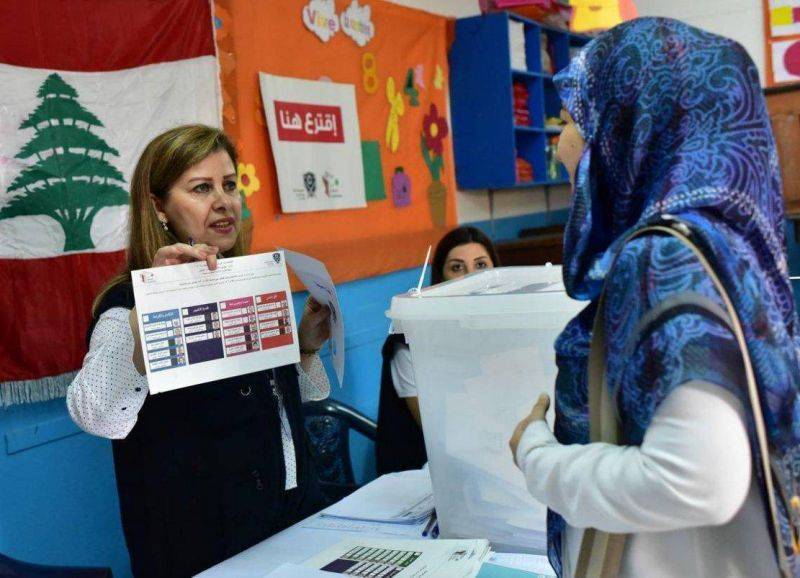
A polling station for Lebanese abroad in Abidjan, Ivory Coast, in April 2018. (Credit: Issouf Sanogo/AFP)
Want to get the Morning Brief by email? Click here to sign up.
Within hours of President Michel Aoun sending electoral law amendments back to MPs for reconsideration, Parliament Speaker Nabih Berri called for a joint committee session on Tuesday to discuss the proposed changes. The amendments, approved by Parliament on Tuesday, include moving the vote’s date from May 8 to March 27. In a letter to Parliament, Aoun objected to early elections, noting that thousands of voters who will turn 21 from March 27 to May 8 will not have reached the voting age if elections are moved up and would therefore be deprived of their right to political participation. The president also claimed that the weather, which he said is usually stormy during this period, may pose logistic issues to holding early elections. Parliament originally changed the date ostensibly to avoid campaigning during the Muslim holy month of Ramadan, but observers have suggested that backers of early elections have more strategic motives. Aoun’s son-in-law, Free Patriotic Movement leader MP Gebran Bassil, has been the strongest vocal opponent of the change.
Hezbollah and the Amal Movement continued their verbal attacks against Beirut port blast probe head Judge Tarek Bitar over the weekend. Hezbollah deputy head Naim Qassem argued on Saturday that Bitar poses “a real problem” for Lebanon and that it would be better “if he rescued himself so that the [country’s] situation can stabilize.” Amal released a statement the same day criticizing the “politicizing” of the investigation, claiming that Bitar receives orders behind the scenes from presidential adviser and former Justice Minister Salim Jreissati. Jreissati brushed off the allegations on Sunday, describing them as “fake and empty” and calling the party’s stance toward the case suspicious.
The fallout from the deadly Oct. 14 Tayyouneh clashes continued late last week, with Public Prosecutor Ghassan Oueidat denying reports that he had blocked a Military Tribunal summons for Lebanese Forces leader Samir Geagea. Reports that Oueidat had blocked the summons surfaced on Friday afternoon, after Geagea said in a TV interview the night before that he had not been informed of any summons, and that he would appear before the Military Tribunal “only if Hezbollah chief Hassan Nasrallah is questioned first.” The Hezbollah leader has accused Geagea’s LF of opening fire on supporters from his party as they were gathering for a protest against Bitar and what Hezbollah has called the “politicization” of the Beirut port blast probe. Seven people were killed and more than 30 were injured in the firefight that ensued.
For the second time in five months, the Israeli Army claims to have foiled a smuggling operation across Lebanon’s southern border, saying it seized weapons and drugs. “Our forces thwarted a smuggling attempt at the border with Lebanon, after having observed [on Friday] night a number of suspects in the region of Metula,” read a tweet from the Israeli military’s Arabic-language spokesperson, Avichay Adraee. In foiling the attempt, the Israeli Army said it found two handguns and a box containing 9 kilograms of drugs worth $110,000. Israel made a similar announcement in July, when it reported that it had seized weapons being trafficked from Lebanon.
Year-over-year inflation in Lebanon was 144.12 percent in September, Lebanon’s Central Administration for Statistics reported. September marked the 15th straight month that the consumer price index, which records changes in the price of commonly purchased goods, clocked triple-digit annual growth. Notably, transportation costs skyrocketed by 356.91 percent year on year, and the cost of water, electricity, gas and other fuels increased by 182.44 percent. These price increases took place against a backdrop of the near-complete removal of central bank fuel subsidies. The state hiked fuel costs yet again last week, sending the price of 20 liters of gasoline soaring to more than LL300,000 — almost half the monthly minimum wage — while a tank of cooking gas now costs more than a third the minimum wage. Other increases were recorded in the cost of food and nonalcoholic beverages, which rose by 280.86 percent year on year, and of health care, which rose by 212.08 percent.